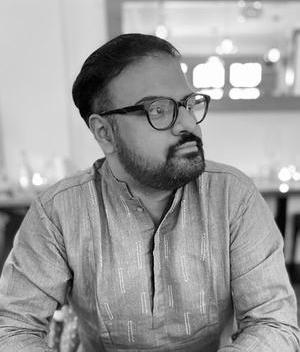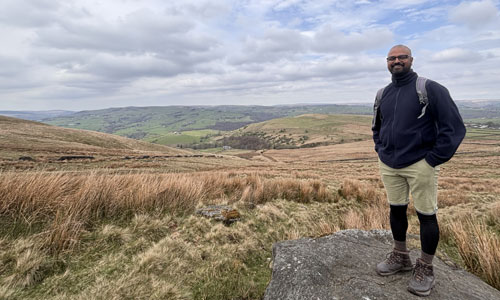South Asian Heritage Month: Dr Arya Gupta

Can you tell us about yourself?
I am Arya, pronounced as R-Joe, and this has always been a conversation starter as the pronunciation of my name could not be any further from the spelling. However, it gives me the opportunity to explain the structure of my mother tongue, Bengali. Being Bengali means I love fish and afternoon siestas – although being Senior Lecturer in Biomedical Science does not allow for the latter. That’s what the weekends are for! I moved to the UK 15 years ago from Kolkata, India, to pursue my MSc at University of Leeds, UK. After a couple of postdocs following my PhD, I am now based at Leeds Beckett University, UK.
I have a three-pronged approach to combatting antimicrobial resistance (AMR):
- understand the interplay between microbiota in the human nose (commensals) and pathogen (mainly Staphylococcus aureus);
- augment the activity of existing antibiotics by using them in conjunction with drugs used to traditionally treat non-bacterial diseases such as cancer or high blood pressure; and
- develop point-of-care diagnostic tests to rapidly detect bacterial sepsis which can facilitate the prompt application of antibiotic treatment.
It’s South Asian Heritage Month from 18 July to 17 August; will you be doing anything to raise awareness or celebrate?
Honestly, I had no idea that South Asian Heritage Month existed before. I am very proud of my heritage and always celebrate my background. Personally, I struggle to understand the need to have specific months or days to celebrate/raise awareness (of) something. The Indus Valley Civilisation (one of the earliest urban cultures) flourished for 2000 odd years from around 3300 BC; safe to say we have existed for a while.
I think people need to make more of an effort to learn about other cultures/heritages rather than someone preaching to them about it. Seeing the effort put in from one side makes the other side want to engage more proactively. For example, I was in Les Saise in France, with not many English speakers in the village. I found myself in the bakery the first morning trying to order baguettes in English and ended up pointing at stuff behind the counter to communicate. I got what I needed, but personally did not enjoy the experience. That evening, I used Google translate to help me order a plain and cheese baguette in French. The morning after, I went back and ordered in my broken French and received a friendly smile of acknowledgement. It always takes two to tango, being aware of the situation and surroundings is paramount. If someone isn’t interested in learning about a certain culture then no amount of awareness will change that.
The theme of this year’s awareness month is ‘Roots to Routes’ which is about reflecting on your journey, whether from ancestral origins or something more recent, and how these experiences shape your identity. Is this something that speaks to you, having moved to the UK from India to study and work?
When I reflect on where I am today, the past 15 years would have been moot if my parents had not supported me in pursuing an MSc. I wouldn’t be writing this today if it weren’t for their support. Growing up, I appreciated the importance of family, friends, hard work and discipline.
Having a strong foundation is paramount in how one perceives their identity. Being Bengali, the thought of food is never far away. We think about the next meal even before we start the present one! Food is memories, I learnt how to cook from my grandma and Ma. I observed what they did in the kitchen and, today, I try to recreate some of those dishes. It is my getaway and solace; it relaxes me, keeps me grounded and brings me joy. Unsurprisingly, both are important factors when we talk about work-life balance.
Speaking of roots, it would be remiss of me not to highlight the strong friendships I have been able to make since moving to the UK. From Leeds to London to Canterbury I have been lucky to have made lasting friendships. While it is imperative to not forget where you come from, it is also acceptable to lay down new roots and integrate with the community and culture you are currently part of.

When and why did you first become interested in microbiology?
Both my parents are doctors; medicine and health has a strong representation in my family. My interest in medicine and infectious diseases existed since my early teens. Would it surprise you to know that biology was my favourite subject in school? Despite being the only child, I was never pressured to pursue a career in medicine following school. It was at this juncture that I realised microbiology would keep me connected to both of those early passions – infectious diseases and how it affects human health. I have never looked back since.
If you hadn’t gone into science, what career path would you have chosen?
I’d either have pursued a career as a pro-golfer or a chef. I used to play competitively but chose the path of education instead. However, in recent years I have started a food pop-up called Bideshi, Flavours of Kolkata. This idea stemmed from the frustration of the perception of Indian food in the UK – oniony, tomatoey, creamy gravies. There is much more to Indian food than that. I come from Eastern India where we use a lot of whole spices, mustard oil, mustard paste and poppy seed paste, amongst other commonly used ingredients. The dishes in this region are light, yet hearty and filling. Kolkata is a melting pot of cultures which has also influenced our dishes over time.
As someone working in microbiology in the UK from a South Asian background, have you faced any challenges because of your background?
One challenge I faced was navigating the funded PhD positions, as most of them specified either UK or EU citizenship. However, I think one of the biggest challenges is the worry of not finding a job (if one is inclined to stay in the UK) before an existing visa expires. The other is dealing with the underlying racism that unfortunately still exists. I personally have been on the receiving end of four racial incidents, one which involved having a takeaway bag thrown at me from a moving car. I’ve also been asked to go back to where I came from. But those incidents don’t define me. What defines me is my family, friends, my beliefs and my actions. However, I also acknowledge that everyone faces challenges, and I consider myself very lucky to have a secure job and a roof over my head.
Is there any advice that you would give to people from the same background who are working (or hoping to work) in science?
My biggest advice would be to always give it your 100%; control the controllables. Network and make connections when the opportunity rises. We as immigrants have added pressure on finding jobs as visas are dependent on this and it can lead to stress and pressure. Believe me I know! The sheer amount of paperwork and constantly going over the form to ensure that you haven’t missed anything or incorrectly ticked a box you shouldn’t have – I’ve been there. I did not have help during my transitions from PhD to postdoc to Senior Lecturer, but I planned early and kept an eye out to give myself the best chance.
Do you have any role models, if so, who?
My role model is my maternal grandfather, Dadu. He was the most humble, kind, intelligent and well-read person I have ever known. He loved travelling, so much that he climbed Machu Picchu with a broken arm in his 70s. The biggest thing that I’m still learning from him is the ability to leave work at work. So, if I can be even 1% of what he was like, I’d say I’ve done well in life.
You currently sit on the Society’s Impact and Influence Committee, what made you decide to get involved in the Society’s governance?
As researchers, the most important quality to have is being able to successfully communicate to the public in terms that they can relate to/understand. At the end of the day, what we do is for the benefit and improvement of public health. I joined the Impact and Influence Committee to help educate more people about AMR across the wider community, engaging with other organisations and policy makers to influence meaningful change.
Do you think representation of people from a variety of backgrounds within the Society’s governance is important?
Absolutely 100%. To be the leading Microbiology Society around the globe, our organisational structure must have people from a variety of backgrounds.
If you are interested in growing your network via Society activities, like Arya has, find out more via our Get Involved hub.
